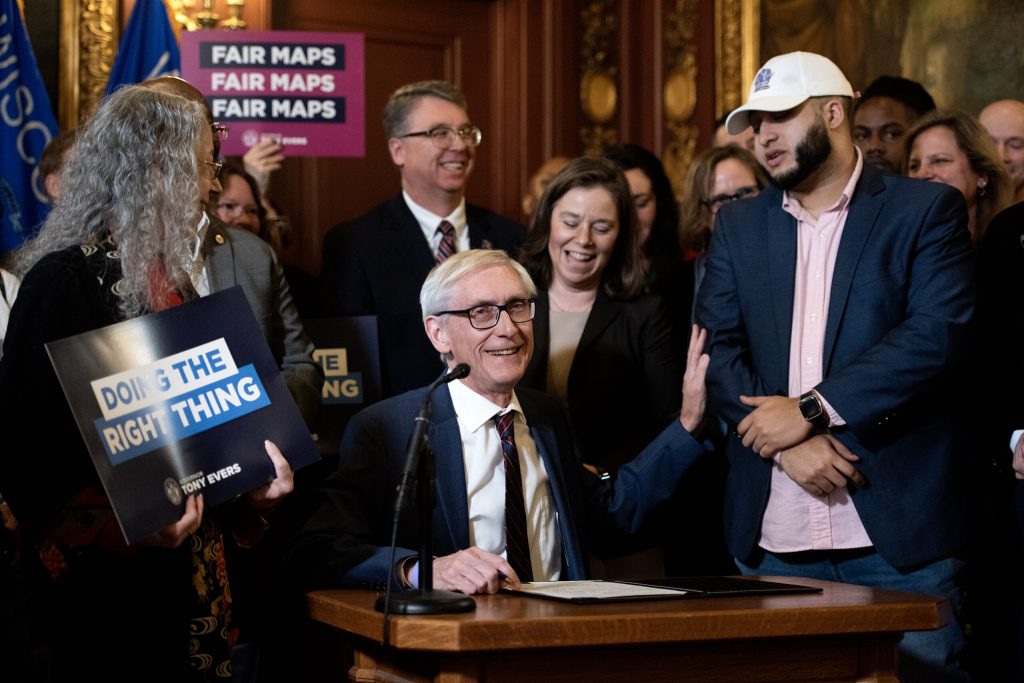Evers Signs Legislative Maps Into Law, Ending Court Fight
Maps reduce GOP's advantage, GOP avoids court drawing new maps via gerrymandering lawsuit.

Gov. Tony Evers signs the bill Monday, Feb. 19, 2024, at the Wisconsin State Capitol in Madison, Wis. (Angela Major/WPR)
Gov. Tony Evers has signed new legislative maps into law, potentially loosening the GOP grip on power in Wisconsin state government for the first time in well over a decade.
Evers’ signature effectively ends a years-long fight by Democrats to rebalance the political playing field in Wisconsin, where Republican-drawn maps have cemented lopsided GOP majorities in a state that otherwise has a penchant for close elections.
Surprisingly, they did. The new maps passed by the Legislature and signed by Evers are identical to those the governor submitted to the court as one of six options to replace the Republican-drawn districts. Redistricting experts hired by the court’s liberal majority say the governor’s maps have a slight Republican tilt but are competitive enough that “the party that wins the most votes will win the most seats” in the state Legislature.
In a social media post, Evers said “when i promised I wanted fair maps — not maps that are better for one party or another — I damn well meant it.” The people should get to choose their elected officials, not the other way around,” Evers said. “And under the maps I’m signing today, I am making good on that promise.”
BREAKING: I've promised from the beginning that I will always try to do the right thing. Today, I'm keeping that promise and I'm signing fair maps for Wisconsin.
Wisconsin, for the first time in over a decade, we will not have some of the most gerrymandered maps in America. pic.twitter.com/jc5RUGY0mM
— Governor Tony Evers (@GovEvers) February 19, 2024
Unlikely bipartisan alliance led to Evers’ maps becoming law
In a remarkable about face, Evers’ maps were introduced last week by Republican lawmakers who had argued against them in court weeks before. The maps passed both houses within hours without any public hearing.
At the same time, groups that have long called decried gerrymandering in Wisconsin encouraged Evers to sign his maps into law. In a statement, those groups said that despite concerns surrounding the process used by Republicans, it has “created an opportunity for real change” that will make Wisconsin’s “democracy stronger and more inclusive.”
Unanswered questions remain going into 2024 elections
While a governor’s signature may seem like the final piece of the state’s redistricting puzzle, there are still questions about what districts lawmakers might run in between now and the November general election.
A line included at the end of the 165-page bill specifies the maps will go into effect for all elections in November, but won’t apply to “special or recall elections” held before then.
Democratic state senators, who got their first look at the legislation just before the Senate voted, accused Republicans last week of including the exception to guarantee Vos can run under his old district in a potential recall election. That contest is being pursued by conservatives who are angry he’s stood in the way of impeaching Wisconsin Elections Commission Administrator Megan Wolfe.
University of Wisconsin-Madison Associate Professor of Law Robert Yablon, who signed onto a legal brief in the redistricting case, told WPR it’s “an open question” as to which maps should apply between now and the November election.
“So, if an early election needed to be held, the likelihood is that someone would need to go back to the Wisconsin Supreme Court and ask what map would be applied,” Yablon said. “And the Wisconsin Supreme Court would need to provide some kind of guidance or remedy.”
Yablon said that because the court has already declared the existing Republican-drawn districts illegal, “it will have to be another map, perhaps the Governor’s map” even though that map doesn’t go into effect until the fall.
Redistricting saga: How we got here
There’s been no shortage of twists and turns in Wisconsin’s latest redistricting battle, which started with a lawsuit filed the day after the Wisconsin Supreme Court flipped to liberal control for the first time in 15 years.
The suit, filed by a group of Democratic voters represented by liberal law firm Law Forward, argued Republican-drawn districts enacted in 2022 by the Supreme Court’s then-conservative majority were “extreme partisan gerrymanders” that violated multiple provisions in the Wisconsin Constitution. They claimed the maps violated Democrats’ equal protection guarantee and its promises of free speech and assembly.
In response, Republican lawmakers demanded newly sworn Justice Janet Protasiewicz recuse herself from the case because of comments she made on the campaign trail calling the GOP maps “rigged” and saying there needs to be “a fresh look at the gerrymandering question.” When Protasiewicz refused to step aside, it amplified calls from some Republicans that she should be impeached. Vos had also said the U.S. Supreme Court “will have the last word” on the matter.
On Dec. 22, the court ruled the Republican maps did violate the Constitution’s contiguity requirement. The liberal majority asked parties in the case to submit new map proposals that addressed constitutional requirements while also taking “partisan impact” into account.
The court hired University of California, Irvine political scientist Bernard Grofman and Carnegie Mellon University political scientist Jonathan Cervas to evaluate map proposals from the Republican-controlled Legislature, Gov. Evers, Republican voters represented by the conservative Wisconsin Institute for Law and Liberty, or WILL, Democrats who filed the suit, Democratic state senators and a group of academics. Their analysis called maps from the Legislature and WILL gerrymanders and said any of the four remaining proposals would be far more competitive than what the court struck down.
The December ruling called on the Legislature and governor to agree to maps but said the court would enact new maps if there was an impasse.
Republicans initially passed a version of Evers’ maps with a handful of changes to protect GOP incumbents, but the governor vetoed the plan, calling it gerrymandering. Weeks later, Republicans passed Evers’ identical maps, which the governor signed Monday morning.
Another lawsuit challenging GOP-drawn congressional districts awaits court
As one Wisconsin redistricting saga draws to a close, another could be just beginning.
While the new maps signed by Evers apply to the state Assembly and state Senate districts, a new lawsuit filed by a high-profile Democratic law firm is challenging Wisconsin’s eight congressional districts. Six of those are held by Republicans.
The congressional lawsuit hinges on a finding by justices in the legislative redistricting case, where the liberal majority rejected the “least changes” rationale used by the court’s conservative majority just two years earlier. Under that approach, the court’s conservatives chose both legislative and congressional maps that were similar to the ones Republicans drew in 2011 when they controlled all branches of state government following an historic wave election.
In December, the new liberal majority ruled that the “least changes” had no basis in state law or the Constitution, overruling it entirely. The court has yet to decide whether it will hear the congressional case.
The new legislative maps could also face their own lawsuit — potentially in federal court — on a different set of issues, including the number of voters who will have to wait an extra two years to vote in a race for state Senate. But both Democrats and Republicans have said such a challenge would face an uphill climb, and that judges would be reluctant to overturn a map passed by a Republican Legislature and signed into law by a Democratic governor.
Evers signs new maps into law, effectively ending Wisconsin redistricting lawsuit was originally published by Wisconsin Public Radio.
If you think stories like this are important, become a member of Urban Milwaukee and help support real, independent journalism. Plus you get some cool added benefits.
More about the Gerrymandering of Legislative Districts
- Without Gerrymander, Democrats Flip 14 Legislative Seats - Jack Kelly, Hallie Claflin and Matthew DeFour - Nov 8th, 2024
- Op Ed: Democrats Optimistic About New Voting Maps - Ruth Conniff - Feb 27th, 2024
- The State of Politics: Parties Seek New Candidates in New Districts - Steven Walters - Feb 26th, 2024
- Rep. Myers Issues Statement Regarding Fair Legislative Maps - State Rep. LaKeshia Myers - Feb 19th, 2024
- Statement on Legislative Maps Being Signed into Law - Wisconsin Assembly Speaker Robin Vos - Feb 19th, 2024
- Pocan Reacts to Newly Signed Wisconsin Legislative Maps - U.S. Rep. Mark Pocan - Feb 19th, 2024
- Evers Signs Legislative Maps Into Law, Ending Court Fight - Rich Kremer - Feb 19th, 2024
- Senator Hesselbein Statement: After More than a Decade of Political Gerrymanders, Fair Maps are Signed into Law in Wisconsin - State Senate Democratic Leader Dianne Hesselbein - Feb 19th, 2024
- Wisconsin Democrats on Enactment of New Legislative Maps - Democratic Party of Wisconsin - Feb 19th, 2024
- Governor Evers Signs New Legislative Maps to Replace Unconstitutional GOP Maps - A Better Wisconsin Together - Feb 19th, 2024
Read more about Gerrymandering of Legislative Districts here





















A huge step forward for democracy in WI. I am excited.
And GOP can’t say Evers isn’t a man of his word either on this.
Looking forward to these new lines and candidates/races/elections/results/etc.
a big step towards competitive races